
 For once, we get an original news item from L'Osservatore Romano:
Vol. 2 of 'Collected Works':
For once, we get an original news item from L'Osservatore Romano:
Vol. 2 of 'Collected Works':
Joseph Ratzinger's full dissertation
'Revelation and the theology of history
in St. Bonaventure'
Translated from
the 9/16/09 issue of

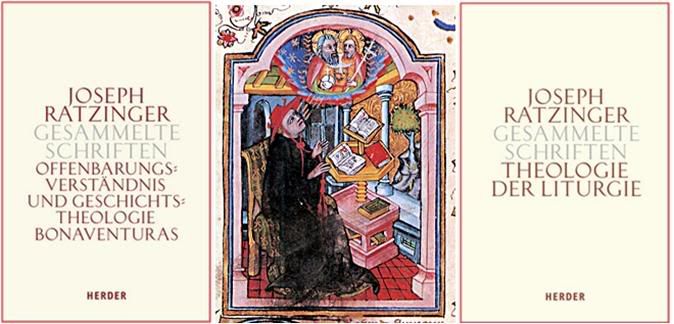
The second volume of Joseph Ratzinger's
Gesammelte Schriften (Collected Works) is a true and proper
editio princeps, a first edition.
It is the first publication ever of the integral text of the dissertation that then Fr. Ratzinger wrote to obtain his Habilitation license to teach in German universities. Together with related essays, the volume has over 900 pages of text.
[Because of a resounding rejection of the full text by his thesis adviser at the time, Ratzinger decided, instead of writing a whole new thesis, to rewrite and submit only the second part of his text, about St. Bonaventure's theology of history, which was readily approved, and subsequently published.]
After Vol. 1 of the Collected Works -
The Theology of Liturgy: Sacramental Foundation of Christian Existence - published in October 2008, Vol. 2 is entitled
Offenbarungsverständnis und Geschichtstheologie Bonaventuras (An understanding of Revelation and Bonaventure's theology of history).
The Pope dedicated the book with 'gratitude' to his brother Georg, on the occasion of his 85th birthday.
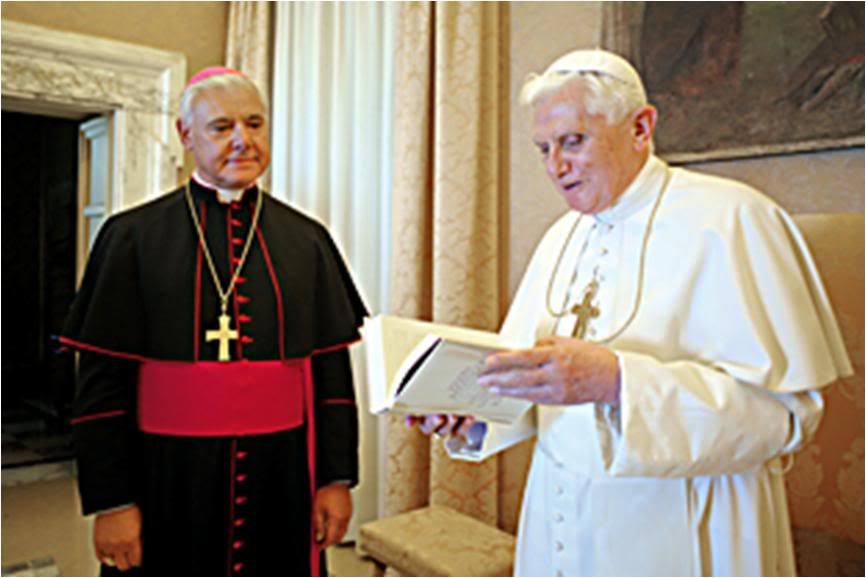
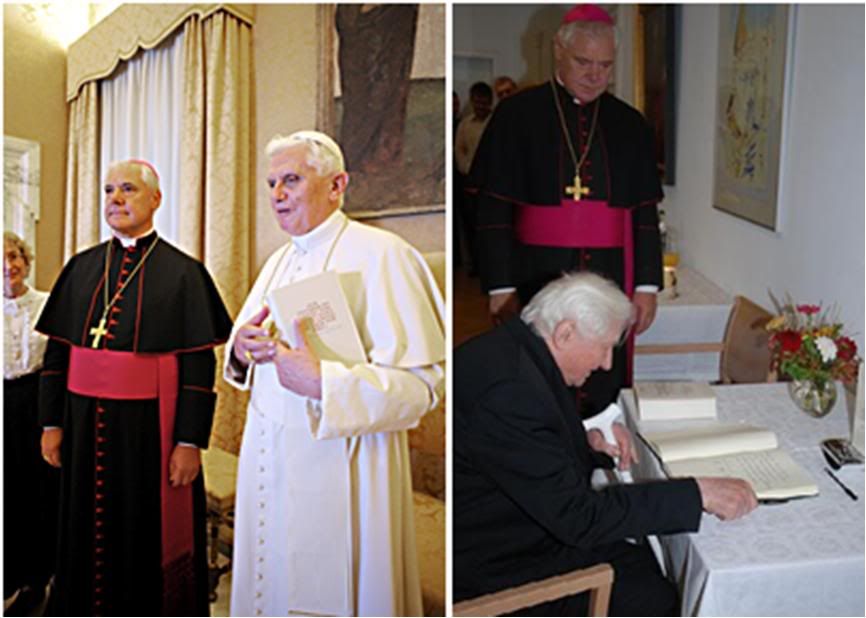
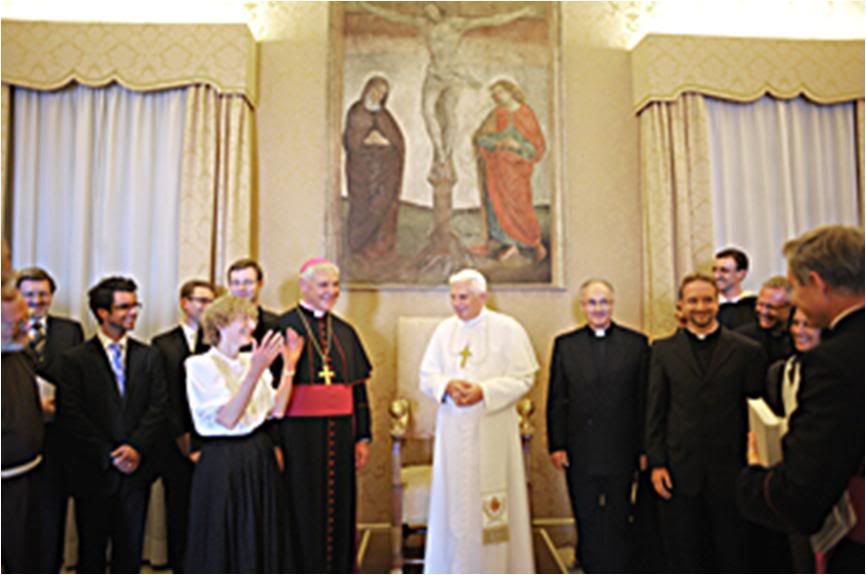
A copy of the new book was presented to Pope Benedict XVI on Sunday, Sept. 13, at Castel Gandolfo, by Bishop Gerhard Mueller of Regensburg, who heads the Institut Benedikt XVI responsible for the monumental 16-volume project.
Also present were volume editor Marianne Schlosser and other members of the Institut Papst Benedikt XVI based in Regensburg.
The following day in Regensburg, Bishop Mueller and the Institut also presented a copy of the book to Mons. Ratzinger.
In tomorrow's issue, the OR also publishes an Italian translation of the Preface written by the Holy Father for Vol. II. Here is a translation to English based on it:
Bonaventure and the story of salvation
Preface to Vol. II
'Joseph Ratzinger: Gesammelte Schriften'
by POPE BENEDICT XVI
After the publication of my writings on liturgy, what comes next in the general edition of my works is a book with my studies on the theology of the great Franciscan and Doctor of the Church, Bonaventura Fidanza.
From the very beginning, it was evident that this volume would also include my studies on the saint's concept of Revelation which I conducted in 1953-1955 - along with my interpretation of his theology of history - but never published till now.
To complete this work, the manuscript had to be reviewed and amended according to current publishing norms, which I was not in a position to do myself. Prof. Marianne Schlosser of Vienna, a profound connoisseur of medieval theology and, particularly, of St. Bonaventure's works, offered to undertake such a task which was necessary and certainly not easy. For this, I can only thank her with all my heart.
Discussing the project, we agreed right away that we would not try to re-elaborate the book's contents and bring its research up to date. More than half a century after it was first written, this would have meant writing a new book altogether.
Besides, I wanted it to be a 'historical' edition of a text as it was conceived in a distant past, leaving researchers the possibility of finding some use for it even today.
Prof. Schlosser's Introduction deals with the editorial work she undertook along with her co-workers who dedicated much time and effort to present a historical edition of the text, trusting that, theologically and historically, it was worth the trouble to make it accessible to everyone in its entirety.
The second part of the volume presents once more The theology of history in St. Bonaventure as it was first published in 1959.
The essays that follow are taken, with few exceptions, from my studies on the interpretation of Revelation and the theology of history. In some cases, they have been adapted to present a text that can stand alone, with light modifications to suit the context.
In the past, I had to temporarily abandon the idea of updating the manuscript and presenting it as a book to the public, along with a project for s commentary on the Hexaëmeron, because my activities as a Conciliar consultant [of Vatican II] and my academic work were too demanding to allow me to carry on my research on the Middle Ages.
In the post-Conciliar period, the changed theological situation and the new situation in the German universities absorbed me so much that I decided to postpone further work on Bonaventure till after my retirement.
In the meantime, the Lord led me down other paths, and thus, the book is being published now in this form. I hope others can carry out the task of writing a commentary on the Hexaëmeron [Bonaventure's spiritual interpretation of the days of Creation in Genesis].
At first glance, the exposition of the theme of this work may appear surprising, and in fact, it is. After my thesis on St. Augustine's concept of the Church, my academic adviser Gottlieb Söhngen suggested that I should dedicate myself to the Middle Ages, particularly St. Bonaventure, who was the most important representative of Augustinian thought in medieval theology.
For the actual content, I felt that I must confront the second important question for fundamental theology, namely, the subject of Revelation.
At that time, especially due to the famous work by Oscar Cullman, Christus und die Zeit (Christ and Time) (Zürich, 1946), the subject of the story of salvation, especially its relation to metaphysics, had become the focal point of theological interest.
If Revelation was understood essentially in neo-scholastic theology as the divine transmission of mysteries, which remain inaccessible to the human intellect, today Revelation is considered as a manifestation of God himself in historical events, and the story of salvation is seen as a central element of Revelation.
My task was to try and discover how Bonaventure understood Revelation, and whether for him, there existed anything similar to an idea of 'the story of salvation'.
It was a difficult task. Medieval theology does not have any treatise on revelation as there is in modern theology. Moreover, I immediately could demonstrate that medieval theology did not even have a term to express substantially (content-wise) our modern concept of Revelation.
It became increasingly clear that the word revelatio, which is common to both neo-scholastic and medieval theology, does not mean the same thing in both periods.
Thus, I had to find the answers to my formulation of the problem in other forms of language and thought, and modify my approach as I got to know Bonaventure's work more closely.
First of all, I had to carry out difficult research on his very language. And I had to set aside all our current concepts to understand what Bonaventure understood by Revelation.
In any case, it was clear that the conceptual content of Revelation was applied to a a great number of concepts: revelatio, manifestatio, doctrina, fides, and the like. Bonaventure's idea of Revelation could only be understood through an integral view of these concepts.
The fact that medieval doctrine did not have a concept of the 'story of salvation' in its present sense was clear form the start. But there were two indications that Bonaventure did consider the problem of Revelation as a historical event.
First of all, the double aspect of Revelation in the Old and New testaments, which posed the question of the harmony between the unity of truth and the diversity of the historical mediation, that had been posed since the time of the Fathers and also considered by medieval theologians.
To this classical form of the problem of relationship between truth and history, which Bonaventure shared with the theology of his time and which he confronted in his own way, he also added the novelty of his historical point of view, in which history - as a continuation of God's work - becomes a dramatic challenge.
Joachim of Fiore (d 1202) had taught a Trinitarian rhythm in history. The Age of the Father (Old Testament) and the Age of the Son (New Testament) were to be followed by the Age of the Holy Spirit, during which, through the observance of the Sermon on the Mount, a spirit of poverty, reconciliation among Greeks and Latins, reconciliation among Christians and Jews would be manifest, thus arriving at a time of peace.
Through a combination of symbolic ciphers, the erudite abbot predicted the start of the new age in 1260. Around 1240, the Franciscan movement came across these writings, which had an electrifying effect on many among them: Was it possible that this new age had begun with Francis of Assisi?
Thus, within the order, there came to be a dramatic tension between the 'realists', who wished to use the legacy of St. Francis according to the concrete possibilities of life within the Order as it was handed down to them, and the 'spiritual ones' who were focused on the radical newness of a new historical period.
As Minister-General of the Franciscans, Bonaventure had to face the enormous challenge of this tension which, for him, was no mere academic question, but a concrete problem in his responsibility as the seventh successor to St. Francis.
In this sense, history was unexpectedly tangible as reality, which he had to face with real action as well as theological reflection. In my study, I tried to explain how Bonaventure met this challenge and linked 'the story of salvation' to Revelation.
I had not been able to review the manuscript since 1962. Therefore, I was enthusiastic to re-read it after such a long time. It is clear that the presentation of the problem as well as the language of the book were influenced by reality in the 1950s. Especially since the technical means now available for linguistic research did not exist at the time. Thus the work has limitations and is evidently influenced by the historical period during which it was conceived.
Nonetheless, in rereading it, I had the impression that its answers are well-founded, although outdated in many details, and that it still has something to say today.
Above all, I realized that the question about the essence of Revelation, and the fact of re-proposing it, which is the subject of the book, still have an urgency today, perhaps more than in the past.
At the end of this Preface, I wish to express my gratitude not only to Prof. Schlosser but also to the Bishop of Regensburg, Gerhard Ludwig Müller, who, through the establishment of the Institut Papst Benedikt XVI, has made possible the publication of this book, and has actively participated in the processing of my writings for publication.
I also thank the workers at the Institute, Professor Rudolf Voderholzer, Dr. Christian Schaller, and Messrs. Franz-Xaver Heibl and Gabriel Weiten.
Last but not least, I thank the publishing house Herder, which has concerned itself with the publication of this book with the accuracy that characterizes them.
I dedicate this book to my brother Georg for his 85th birthday, in gratitude for a whole life's communion of thought and togetherness.
Rome
Solemnity of the Ascension of Christ
(May 21) 2009

 Here are related news briefs from the Institut Benedikt XVI webpage on the website of the Diocese of Regensburg:
Bagnoregio colloquium last week
Here are related news briefs from the Institut Benedikt XVI webpage on the website of the Diocese of Regensburg:
Bagnoregio colloquium last week
to discuss the Ratzinger studies
on St. Bonaventure

In connection with the publication of the second volume in the Collected Works of Joseph Ratzinger, the Institut Papst Benedikt XVI sponsored a three day colloquium in Bagnoregio on Sept. 11-13, on the subject 'Revelation and thr Story of Salvation: The theological, historical and systematic aspects of Joseph Ratzinger Bonaventurian studies".
Participants in the Colloquium were the director of the Institut Papst Benedikt XVI, Prof. Dr. Rudolf Voderholzer; Prof. Dr. Marianne Schlosser, a world-renowned Bonaventure scholar; the secretary of the International Theological Commission, Fr. Charles Morerod; Fr. Maximilian Heim [who has written a book on Joseph Ratzinger's theology], and Prof Richard Schenk from the University of Berkeley.
Bagnoregio is the site of the Center for Bonaventure Studies.
Institute also starts publishing
parallel series of commentaries
on the Collected Works

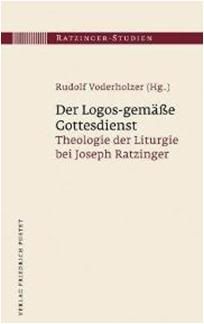
The Institut Papst Benedikt XVI has published the first volume of a book series called
Ratzinger Studien of commentaries on the Collected Works of Joseph Ratzinger.
The volume, entitled
Der Logos-gemaesse Gottesdienst: Theologie der Liturgie bei Joseph Ratzinger [Worship corresponding to the Logos: The theology of liturgy according to Joseph Ratzinger), consists of commentaries on Vol. 1 of the Collected Works,
The Theology of Liturgy, in which the writers consider the liturgical, dogmatic, philosophical, musical and spiritual aspects of Joseph Ratzinger's writings on liturgy.
One or two such commentary books will be published each year parallel to the volumes of the Collected Works. Appropriate experts will comment, interpret and discuss the corresponding books.
Other research work on Ratzinger's theology will also be published eventually in the series, edited by Dr. Rudolf Voderholzer, director of the Institut Papst benedikt XVI, and published by Friedrich Pustet publishing house.
A refresher:
The volumes in GESAMMELTE SCHRIFTEN
1. Volk und Haus Gottes in Augustins Lehre von der Kirche
Die Dissertation und weitere Studien zu Augustinus von Hippo
(The People and the House of God in Augustine's Teachings on the Church:
Dissertation and further studies on Augustine of Hippo)
2. Das Offenbarungsverständnis und die Geschichtstheologie Bonaventuras
Die ungekürzte Habilitationsschrift und weitere Bonaventura-Studien
(Revelation and St. Bonvaenture's Theology of History:
The unabridged Habilitation dissertation and other studies on Bonaventure)
3. Der Gott des Glaubens und der Gott der Philosophen
Die wechselseitige Verwiesenheit von fides und ratio
(The God of Faith and the God of Philosophers: The reciprocal relationship between faith and reason)
4. Einführung in das Christentum
Bekenntnis – Taufe – Nachfolge
(Introduction to Christianity: Profession of Faith - Baptism - Discipleship)
5. Herkunft und Bestimmung
Schöpfung – Anthropologie – Mariologie
(Origin and Destiny: Creation - Anthropology- Mariology)
6. Jesus von Nazareth
Spirituelle Christologie
(Jesus of Nazareth: Spiritual Christology)
7. Zur Theologie des Konzils
Texte zum II. Vatikanum
(On the Thology of the Councl: Texts on Vatican II)
8. Zeichen unter den Völkern
Schriften zur Ekklesiologie und Ökumene
(Signs among Peoples: Writings on Ecclesiology and Ecumenism)
9. Offenbarung – Schrift – Tradition
Hermeneutik und Theologische Prinzipienlehre
(Revelation - Scripture - Tradition: Lessons on hermeneutic and theological principles)
10. Auferstehung und Ewiges Leben
Beiträge zur Eschatologie
(The Resurrection and Eternal Life: Essays on eschatology)
11. Theologie der Liturgie
Die sakramentale Begründung christlicher Existenz
(The Theology of Liturgy: The sacramental foundation of Christian existence) - Published October 2008
12. Künder des Wortes und Diener eurer Freude
Zur Theologie und Spiritualität des Ordo
(Announcers of the Word and Servants of your Joy: The theology and spirituality of the Ordo)
12. Im Gespräch mit der Zeit
Interviews – Stellungnahmen – Einsprüche
(In Conversation with the Times: Interviews - Positions - Objections)
14. Predigten zum Kirchenjahr
Meditationen, Gebete, Betrachtungen
(Homilies for the Liturgical Year - Meditations, Prayers, Observations)
15. Aus meinem Leben
Autobiographische Texte
(My Life: Autobiographical Texts)
16. Bibliographie und Gesamt-Register
(Bibliography and Complete Index)
NB: It was the Pope's decision to come out initially with Volume 11, The Theology of Liturgy, when the series publication began last year.
[Modificato da TERESA BENEDETTA 17/09/2009 01:05]